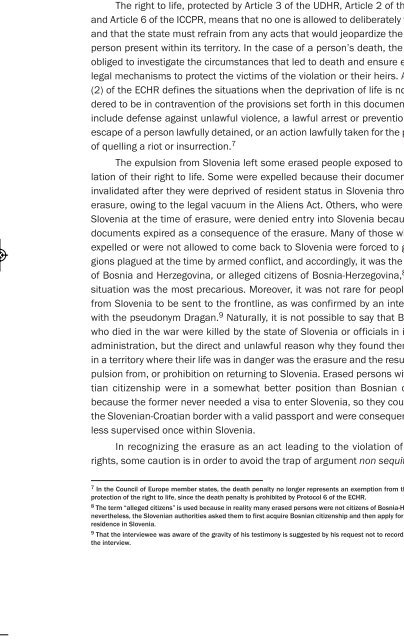The Scars of the Erasure_web
The Scars of the Erasure_web
The Scars of the Erasure_web
- No tags were found...
You also want an ePaper? Increase the reach of your titles
YUMPU automatically turns print PDFs into web optimized ePapers that Google loves.
<strong>Erasure</strong>_4a 10.1.11 20:29 Page 8686 THE SCARS OF THE ERASURE3. Civil and political rights3.1 <strong>The</strong> right to life<strong>The</strong> right to life, protected by Article 3 <strong>of</strong> <strong>the</strong> UDHR, Article 2 <strong>of</strong> <strong>the</strong> ECHRand Article 6 <strong>of</strong> <strong>the</strong> ICCPR, means that no one is allowed to deliberately take lifeand that <strong>the</strong> state must refrain from any acts that would jeopardize <strong>the</strong> life <strong>of</strong> aperson present within its territory. In <strong>the</strong> case <strong>of</strong> a person’s death, <strong>the</strong> state isobliged to investigate <strong>the</strong> circumstances that led to death and ensure effectivelegal mechanisms to protect <strong>the</strong> victims <strong>of</strong> <strong>the</strong> violation or <strong>the</strong>ir heirs. Article 2(2) <strong>of</strong> <strong>the</strong> ECHR defines <strong>the</strong> situations when <strong>the</strong> deprivation <strong>of</strong> life is not consi -dered to be in contravention <strong>of</strong> <strong>the</strong> provisions set forth in this document; <strong>the</strong>seinclude defense against unlawful violence, a lawful arrest or prevention <strong>of</strong> <strong>the</strong>escape <strong>of</strong> a person lawfully detained, or an action lawfully taken for <strong>the</strong> purpose<strong>of</strong> quelling a riot or insurrection. 7<strong>The</strong> expulsion from Slovenia left some erased people exposed to <strong>the</strong> violation<strong>of</strong> <strong>the</strong>ir right to life. Some were expelled because <strong>the</strong>ir documents wereinvalidated after <strong>the</strong>y were deprived <strong>of</strong> resident status in Slovenia through <strong>the</strong>erasure, owing to <strong>the</strong> legal vacuum in <strong>the</strong> Aliens Act. O<strong>the</strong>rs, who were outsideSlovenia at <strong>the</strong> time <strong>of</strong> erasure, were denied entry into Slovenia because <strong>the</strong>irdocuments expired as a consequence <strong>of</strong> <strong>the</strong> erasure. Many <strong>of</strong> those who wereexpelled or were not allowed to come back to Slovenia were forced to go to regionsplagued at <strong>the</strong> time by armed conflict, and accordingly, it was <strong>the</strong> citizens<strong>of</strong> Bosnia and Herzegovina, or alleged citizens <strong>of</strong> Bosnia-Herzegovina, 8 whosesituation was <strong>the</strong> most precarious. Moreover, it was not rare for people exiledfrom Slovenia to be sent to <strong>the</strong> frontline, as was confirmed by an intervieweewith <strong>the</strong> pseudonym Dragan. 9 Naturally, it is not possible to say that Bosniakswho died in <strong>the</strong> war were killed by <strong>the</strong> state <strong>of</strong> Slovenia or <strong>of</strong>ficials in its stateadministration, but <strong>the</strong> direct and unlawful reason why <strong>the</strong>y found <strong>the</strong>mselvesin a territory where <strong>the</strong>ir life was in danger was <strong>the</strong> erasure and <strong>the</strong> resulting expulsionfrom, or prohibition on returning to Slovenia. Erased persons with Croatiancitizenship were in a somewhat better position than Bosnian citizens,because <strong>the</strong> former never needed a visa to enter Slovenia, so <strong>the</strong>y could cross<strong>the</strong> Slovenian-Croatian border with a valid passport and were consequently alsoless supervised once within Slovenia.In recognizing <strong>the</strong> erasure as an act leading to <strong>the</strong> violation <strong>of</strong> humanrights, some caution is in order to avoid <strong>the</strong> trap <strong>of</strong> argument non sequitur. This7 In <strong>the</strong> Council <strong>of</strong> Europe member states, <strong>the</strong> death penalty no longer represents an exemption from <strong>the</strong> absoluteprotection <strong>of</strong> <strong>the</strong> right to life, since <strong>the</strong> death penalty is prohibited by Protocol 6 <strong>of</strong> <strong>the</strong> ECHR.8 <strong>The</strong> term “alleged citizens” is used because in reality many erased persons were not citizens <strong>of</strong> Bosnia-Herzegovina;never<strong>the</strong>less, <strong>the</strong> Slovenian authorities asked <strong>the</strong>m to first acquire Bosnian citizenship and <strong>the</strong>n apply for permanentresidence in Slovenia.9 That <strong>the</strong> interviewee was aware <strong>of</strong> <strong>the</strong> gravity <strong>of</strong> his testimony is suggested by his request not to record this part <strong>of</strong><strong>the</strong> interview.


